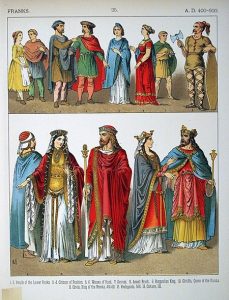
The Franks
The fall of the Roman Western Empire, gathering pace in the last decades of 400AD’s, took with it almost all things Roman: trade, technology, the middle classes (who had been the traders), literacy, centralised written laws and the Latin language, which became confined to the church. Society was noticeably poorer, personal wealth had been stripped by high Roman taxes, the population went into sharp decline thanks to wars, famines and plagues and was short on comforts. On the plus side enemy captives were no longer fed to wild animals.
Not all things Roman were abandoned however. Gallo-Roman society had been run on the res publica (things are a public affair), the province existing for the good of the Empire, but locally administered by members of the Senate responsible to the Emperor. This suited the tribal Franks for whom law and order was very much a community affair. The new empire was divided into what would become Dukedoms and the land, along with the peasantry that came with it, assigned to followers of the Frankish King as Counts with rights to heredity. Each dukedom was allocated an army made up of local landowners, on the proviso that they would come to arms for Francia if needed.

